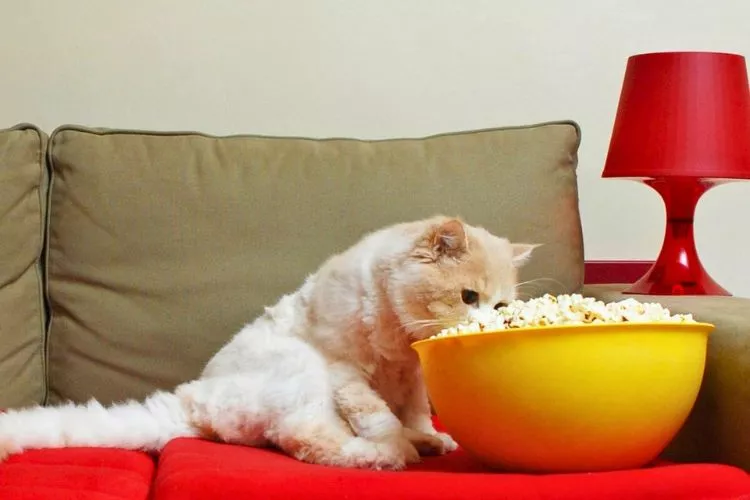Sparkling eyes avidly watching you as you dip your hand into a large popcorn bowl – a common scenario for all cat owners during their movie nights. This sight leads to an inevitable question, ‘can cats have popcorn?’
Before tossing a fluffy popcorn piece, we must consider several crucial elements. Are these kernels safe? Do cats even need popcorn in their diet?

🐾 Can cats have popcorn?
Yes, cats can technically have popcorn. However, popcorn should not form a regular part of a cat’s diet. While the popcorn itself is not necessarily harmful, the additives like salt, butter, and artificial flavors commonly found on popcorn can be unhealthy for cats.
Unpopped kernels can be a choking hazard or cause digestive issues.
Therefore, if you give your cat popcorn, ensure it’s plain, fully popped, and served in small amounts. Remember, popcorn does not offer any nutritional benefits for cats and is void of the necessary proteins and nutrients cats need.
Always prioritize high-quality cat food for your pet’s primary nutrition needs and consult your vet before significantly changing their diet.
🐾 Can kittens eat popcorn?
Kittens should not eat popcorn. While adult cats might manage small amounts of plain popcorn on rare occasions, kittens have much more sensitive digestive systems.
Popcorn can cause choking hazards with hard, unpopped kernels and their small bodies may not handle even small doses of additives like salt and butter that often accompany popcorn.
Most importantly, popcorn lacks the nutrients kittens need for growth and development. Kittens require a diet rich in protein and other specific nutrients, which should come from high-quality kitten food.
Your kitten’s diet is crucial to their health and development, so it’s best to consult a veterinarian before introducing new foods.
🐾 Cat ate unpopped popcorn: What to do?
If your cat has ingested an unpopped popcorn kernel, it’s essential to watch them closely for any signs of discomfort or distress.
While a single kernel might not cause significant harm, it could still lead to choking or digestive issues in some cases.
If your cat shows symptoms such as vomiting, diarrhea, difficulty swallowing, or unusual behavior, it’s best to contact your veterinarian for advice.

Suppose your cat has consumed a large amount of popcorn or any form with additives, such as salt, butter, or artificial flavors. In that case, it is also advisable to consult your veterinarian immediately.
Remember, your pet’s safety should always come first, and it’s better to err on the side of caution when dealing with unpopped popcorn ingestion.
🐾 Can popcorn kill cats?
Popcorn alone is not considered toxic to cats. However, the potential hazards associated with cat popcorn consumption cannot be entirely ruled out.
Consuming a significant amount of popcorn, especially coated with butter, salt, or other seasonings, could lead to health complications. Adding these toppings often results in excessive sodium and fatty acids, leading to potential health issues.
Moreover, unpopped kernels pose a choking risk, and if ingested in large amounts, can cause digestive issues.
While ingestion of popcorn, especially in moderate to large amounts, can be harmful and even possibly life-threatening, it would be an overstatement to claim that popcorn can outright kill cats.
Regardless, it’s always better to prevent and be cautious. Thus, ensuring popcorn, particularly varieties with additives, is kept out of your feline friend’s reach is the best practice.
🐾 Can cats eat the soft part of popcorn?
Yes, cats can eat the ‘soft part’ or the popped popcorn kernel, but it should be plain and free from additives123. The popped kernel is not toxic to cats but provides no nutritional value for them123.
Popcorn toppings like butter, salt, caramel, or other seasonings can cause health issues for your cat.
Moreover, avoiding giving your cat unpopped kernels is essential, as they can be a choking hazard and potentially cause digestive issues2.
Feeding your cat popcorn should be viewed as an occasional treat and not a regular part of their diet.
🐾 Can cats eat salt?
Cats should not consume excessive amounts of salt, which can harm their health. A small amount of salt is added to cat food for flavor and as a necessary nutrient, but giving your cat additional salt in their diet can lead to adverse effects.
Consuming more than 42 milligrams of salt daily can cause electrolyte imbalance, vomiting, and dehydration in cats.
Salt poisoning (sodium ion poisoning) can occur in extreme cases, resulting in tremors, disorientation, seizures, and even fatality.

It is crucial to provide your cat with a balanced diet that contains necessary nutrients in the right proportions, and always consult a veterinarian before making any significant changes to their food intake.
Conclusion :
While it’s not outright toxic, popcorn is not an ideal treat for cats. The potential hazards – from choking on unpopped kernels to digestive issues from additives such as butter or salt – outweigh any minimal enjoyment your pet might derive from this snack.
Moreover, the nutritional value of popcorn for cats is virtually nonexistent, and it should not be considered a substitute for balanced, high-quality cat food.
While the occasional piece of plain, popped popcorn may not cause significant harm, it’s crucial to always monitor your cat when they consume food outside their regular diet.
In the end, the health and wellbeing of your beloved feline companion take precedence over the occasional indulgence.
When considering new treats or changes to your cat’s diet, consultation with a veterinarian is always the best choice.
They can provide advice suited to your pet’s specific health needs and dietary restrictions. Maintain a balanced and nutritious diet for your cat, and keep the popcorn for your movie nights!
